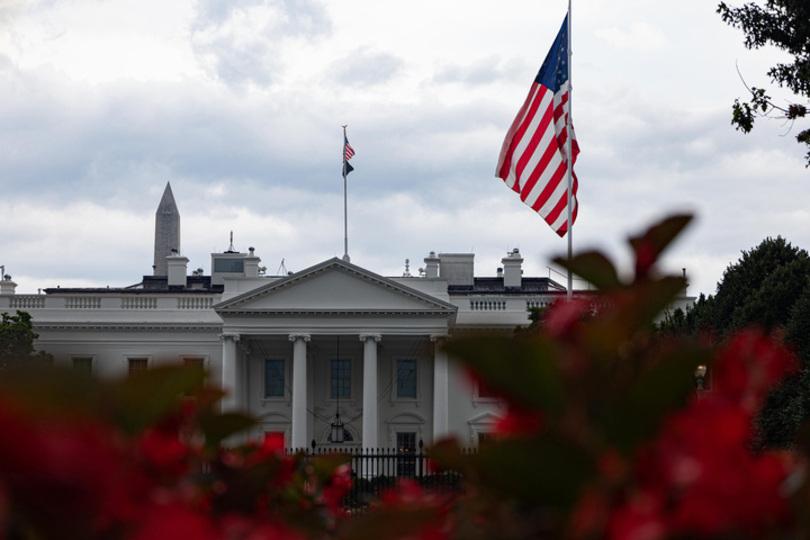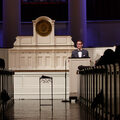Opinion: Charlie Kirk’s death normalizes political violence

Charlie Kirk’s death is a symbol of U.S. descent into normalized political violence. Until we can define these attacks as bipartisan, we risk failing to achieve a stable, consistent democracy that protects all. Cassie Roshu | Senior Staff Photographer
Get the latest Syracuse news delivered right to your inbox.
Subscribe to our newsletter here.
Charlie Kirk was announced dead after being gunned down on Utah Valley University’s campus Wednesday during a debate. His death is proof that the United States has officially and completely entered an era of normalized political violence.
The ramifications of this assassination come from its lack of isolation. The country hasn’t seen a period of political violence like this since the 1960s and arguably the Civil War. In just over one year, we’ve seen two assassination attempts against President Donald Trump and the murder of Minnesota House Speaker Melissa Hortman and her husband.
The underlying theme of all these tragedies is not partisanship but the corrosion of our democratic norms. Kirk and Hortman could not be more politically different, yet they were both killed for being public figures with strong, verbalized beliefs.
The act of politically motivated killing is the paradigm of friend-and-enemy politics, which are the direct cause of democracy’s demise. The U.S. has now reached a point where its citizens see their rivals not as opponents to debate but as enemies to destroy.
Beyond this point, every assassination, act of intimidation and attempt at violence will send the same message: participation in democratic public life now carries a mortal risk.
The gravity of Kirk’s murder is even more shocking given his massive online presence. Few figures on the American right commanded the same reach across social media platforms and traditional TV politics. His endorsements and viewpoints carried significant political weight, and his presence in the public square was deeply polarizing.
But no matter how passionately many disagree with him, Kirk didn’t deserve the fate he met Wednesday.
This new and growing factor in political life only adds gasoline to the fire of our current democratic decline. Democracy won’t collapse in a single dramatic instant; instead, it will wither steadily through fear, silence and the withdrawal of citizens and leaders from open engagement.
The hypocrisy surrounding this violence deepens the wound. When Melissa Hortman and her husband were murdered, many Republicans mocked or dismissed the tragedy, treating it as an unfortunate footnote rather than a national outrage. Utah Senator Mike Lee, for one, sneered at the killings with a tweet reading, “Nightmare on Waltz Street.”
Yet today, after Charlie Kirk’s assassination, the very same senator rushed to declare Kirk an “American patriot,” echoing the wall-to-wall condemnation from Republicans nationwide.
That sort of urgency was nowhere to be found when Democratic leaders were slaughtered in Minnesota. Where was the solemn recognition that an attack on one public servant is an attack on all? A democracy can’t survive if violence is treated as intolerable when it strikes one side but trivial when it strikes the other.
Democracy won’t collapse in a single dramatic instant; instead, it will wither steadily through fear, silence and the withdrawal of citizens and leaders from open engagement.Dennis DiSantis, Columnist
The rejection of political violence must be absolute. It doesn’t matter what side of the political aisle these victims fell upon – violence against one is violence against all. To excuse it when it happens to an opponent is to invite it upon oneself.
Kirk’s assassination must be a turning point. For too long, Americans have treated political violence as the work of solo extremists or as one-off tragedies to mourn and then move past. But the pattern is undeniable. From repeated attempts on Trump’s life, to the murders in Minnesota, to Kirk’s death in Utah, the warning signs are glaring.
The choice is stark: either America reaffirms that its disputes will be settled through ballots and debate, or it resigns itself to a future where political differences are resolved at gunpoint.
The losses our country has faced so far are only the beginning. Charlie Kirk’s death must not be treated as a partisan event. The murders of Melissa Hortman and her husband can’t be chalked up to political aggression.
The reality is that every life ended is a national wound, a reminder that democracy can’t survive when politics is reduced to friend against enemy. If we can’t summon the courage to grieve all of them equally, then we will never summon the courage to end this cycle.
Syracuse University students in particular can’t afford to retreat into silence. University campuses have some of the best incubators for political debate; they are places where new generations develop democratic desires and ideals that shape the future of our republic. If students let the fear of violence drive them from those spaces, our democracy will lose one of its most vital engines.
The preservation of these vital spaces now falls upon us. We must insist that our schools remain open forums of argument, protest and persuasion, uninhibited by the threat of violence.
For the good of our country, our democracy and our future, we must reject the temptation to answer politics with intimidation and force. If we don’t, we risk losing politics itself.
Dennis DiSantis is a senior majoring in political science. His column appears bi-weekly. He can be reached at dadisant@syr.edu.






